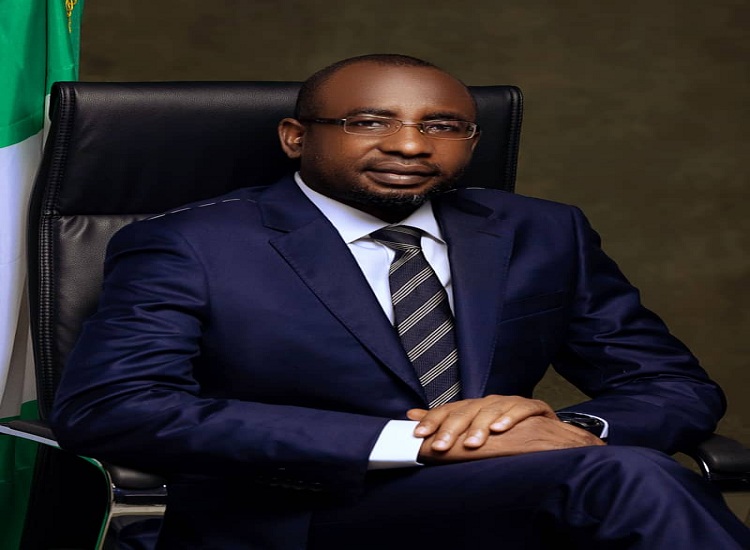Broadcasting
Kashifu Inuwa’s Extraordinary Two Years As DG NITDA

By Mubarak Umar
Two years have gone, and it was just like yesterday, President Muhammadu, GCFR, approved the appointment of Malam Kashifu Inuwa Abdullahi, a Massachusetts Institute of Technology (MIT, USA) – trained IT expert, as the Director General, National Information Technology Development Agency (NITDA), following the elevation of the then Director General, Dr Isa Ali Ibrahim (Pantami) FNCS, FBCS, FIIM, to the position of Minister of Communications, which was his ministry later re-designated to Ministry of Communications and Digital Economy.

With his appointment, it is heartwarming to note that growing corps of well-educated, world class technocrats are coming to the public domain to help change the narrative in public service.
Kashifu Inuwa Abdullahi, the current Director General of (NITDA, has equipped himself with leadership and management courses at Harvard University (USA) and IMD Business School, Switzerland before his appointment as DG, NITDA on 20th August, 2019.
He is one of the growing numbers of leaders appointed by the present administration many Nigerians are proud of.
In these two years, Abdullahi proved to the world that he knows the ICT global terrain deeply and he is very aware of the challenges, limitations and constraints keeping Nigeria – a nation of about 200 million lagging behind in the evolving world of digital economy. Against all odds that face Nigeria’s IT sector, Kashifu has an indefatigable vision and passion to take the nation into the comity of nations running on digital economy.
Tough, it is a herculean task considering six month after his appointment, the entire world found itself fighting an invisible enemy – COVID-19, but that does not stop him from looking outside the box to find out the lasting solutions of the economic challenge posed by the deadly virus.
Abdullahi has already made it to a stage where he plays pivotal roles in Nigeria’s quest to be Africa’s largest digital economy. Since ascending leadership of NITDA, there has been a steady and impressive implementation of the Strategic Roadmap for the Development of Nigeria’s IT sector envisioned by Dr Isa Ali Ibrahim Ibrahim (Kashifu’s predecessor at NITDA who is now Minister of Communication and Digital Economy), as well as implementation of President Muhammadu Buhari’s core vision of Economic Recovery and Growth Plan (ERGP) through Information Technology.
For Nigeria to effectively operate a digital economy, NITDA mapped out a Strategic Roadmap and Action Plan (SRAP 2021-2014), pillars identified by the Agency as the fulcrum for the Roadmap are: 1) Developmental Regulation; 2) Digital Literacy and Skills; 3) Digital Transformation; 4) Digital Innovation & Entrepreneurship; 5) Cybersecurity; 6) Emerging Technologies and; 7) Promotion of Indigenous Content.
SRAP has been broken down into strategic initiatives that speak to its goal. The resultant initiatives were further fragmented into activities and an implementation plan which was in turn developed for these initiatives. Also, a result monitoring framework was developed for identified key performance indicators of each of the initiatives.
The Agency set out strategies to digitize government functions and processes and it successfully created over 150 user accounts to enable Ministries, Departments and Agencies (MDAs) submit their IT projects through the agency’s IT projects clearance portal, licensed of 94 Data Protection Compliance Organizations (DPCOs), and of Nigeria Government Enterprise Architecture/Nigeria e-Government Interoperability Framework (NGEa-Ne-GIF).
Under Kashifu’s watch, NITDA has developed several regulatory frameworks for information technology development, which most of them have been published both on soft copy and hard copy by the Agency.
The Standards, Guidelines and Frameworks developed by NITDA include: Nigeria Government Enterprise Architecture (NGEA); Public Private Partnership regulatory framework for ICT and eGovernment projects; Government Digital Service Framework (GDSFrame); National Block Chain Adoption Strategy Document; Nigeria Digital Agriculture Strategy (NDAS-2020-2030); Business Process Management Guide for Federal Public Institutions (FPIs); Management System Guidelines for Federal Public Institutions (FPIs); Government Digital Transformation Performance (Readiness) Assessment Toolkit (GDT-PAT); and eGovernment Masterplan and Digital Transformation for Jigawa, Nasarawa and Ogun States, to mention a few.
To drive these initiatives, the Agency set up an ICT Technical Working Groups in MDAs to enable the adoption of Ne-GIF, NGEA and other related initiatives to drive ICT, e-Government and made a mandatory ICT Capacity Building for staff of MDAs. It organised Capacity Building and Certification of 442 Digital Transformation Technical Working Group (DT-TWGs) members drawn from different Federal Public Institutions (FPIs).
Furthermore, during these two years, Kashifu continues from where his predecessor stopped in unfolding potential Nigerian farmers through Federal Government initiative of National Adopted Village for Smart Agriculture (NAVSA), to change the face of agric sector in the country.
National Adopted Village for Smart Agriculture is an ecosystem-driven digital platform envisioned for the transformation of the agriculture sector in Nigeria. It is designed to help farmers and other agricultural ecosystem players navigate their journey across the agriculture value chain. This journey cuts across farm production to management, processing, harvesting, storage, marketing and consumption. 565 farmers were trained and empowered with digital devices and N100, 000 seeds funding, which also created jobs direct and indirect jobs in the country.
NITDA also launched the National Adopted School for Smart Education (NASSE) to promote digital literacy and skills among students with 500 students and 30 teachers at Junior Secondary School Karshi benefited from the pilot scheme. The Agency supervised training of a total number of 1,858 Artisans across the 6 Geo-Political Zones on digital literacy and phone repairs.
The Agency also conducted training for 200 women on ICT and Entrepreneurship, each provided with Laptops (pre-installed e-learning & graphics Software), Internet Dongles & Bag-Packs, 1200 direct jobs and 3000 indirect jobs were created; it further graduated 300 Nigerians on Software, Mobile App & Web Development, and Entrepreneurship. People Living with Disabilities were also not left behind, as NITDA trained 30 and 52 persons in Kano and Enugu respectively, and laptops were giving to them as working tools.
In addition to making an effort in IT development as well as enhancing the IT capacity of the citizenry, hundreds of IT Hubs, IT Parks, and Community ICT Centres were either deployed, furnished or equipped with world class facilities across the states of the country.
On cybersecurity, NITDA conducted five (5) incidents analysis affecting National ICT infrastructure, handled 34 hacking of MDAs’ websites, 15 ENDSARS hacking attempts resolved, 10 defacement of MDAs’ websites handled, and dark web monitoring 15 incidents handled.
The Agency, under the supervision of its mother Ministry, launched NITDA Academy for Research and Training (NART) with 67 plus active courses, 58227 plus active students and 55,539 plus active training sessions.
To ensure Nigeria’s fool of talents was not left behind, the Agency Establishment National Centre for Artificial Intelligence and Robotic (NCAIR), NITDA aims through NCAIR, to drive and support the research, development, and adoption of Emerging Technologies in Nigeria.
The Centre is creating the required environment for Nigeria’s teaming youths; encourage innovation and indigenisation of technologies to help address the continuous reliance on foreign products and services which has negative impact on the country’s economy. It serves as a bridge between the Government, industry, and the academia in providing research environment for creativity, idea integration, collaborative environment, development of ICT policies, processes and strategies.
As a result of Kashifu’s commitment, Nigeria made history when it received Public Key Infrastructure (PKI), during the handover ceremony of Root Certification Authority (RCA) for Country Signing Certification Authority (CSCA) and Country Verification Certification Authority (CVCA) of the Federal Republic of Nigeria.
With the strategy already in place, the Agency has succeeded in programming, developing and mapping out digital process to cushion the effect of Coronavirus since it is outbreak globally; Nigeria COVID19 Innovation Challenge, an online innovation challenge that was set up to meet the challenges our society was, and still facing as a result of COVID-19 pandemic. Developers, entrepreneurs and other creative minds joined to experiment and build software solutions to help address this crisis, received overwhelming applicants in Nigeria.
Though, considering the vast technology expertise possessed by the DG, Nigerians always ask why Kashifu Inuwa has such intellectual prowess which makes him an extraordinary Chief Executive in discharging his duties in the last two years as Director General, NITDA.
Broadcasting
US invests $115m in counter-drone tech for World Cup security


Drone
The US Department of Homeland Security (DHS) will invest $115 million in counter-drone technology to safeguard the 2026 FIFA World Cup and events marking America’s 250th independence anniversary, creating a dedicated office for rapid drone system deployment.
Homeland Security Secretary Kristi Noem described drones as “the new frontier of American air superiority,” stressing the need to counter threats from drug cartels using unmanned aircraft for smuggling and surveillance, alongside incidents like a 2025 NFL stadium drone flight and 2024 New Jersey sightings.
The funding supports 11 World Cup host cities expecting over one million visitors, building on FEMA’s $250 million grants to those states and addressing risks heightened by cartels’ advancing tech, including a reported FBI tracking plot in Mexico.
DHS has conducted over 1,500 counter-drone missions since 2018, with the new Program Executive Office accelerating acquisitions amid President Trump’s border security push.
Broadcasting
Youth Talent Takes Center Stage as T2 Ignites High-Octane Rap Battles @ Carnival Calabar

The energy at the Carnival Calabar Music Concert reached a new high as T2 introduced a first-ever rap battle platform, giving young Nigerians an electrifying stage to showcase their talent, creativity, and self-expression while competing for exciting prizes.

Held at the U.J. Esuene Stadium, the activation blended pulsating music, vibrant culture, and youthful energy into a dynamic celebration that kept thousands of carnival-goers fully engaged from start to finish.
Eight fearless contestants stepped into the spotlight, going bar for bar in an intense lyrical showdown. Rappers fused local languages, pidgin, and sharp punchlines, creatively weaving the T2 brand into their verses.
Anchored by the energetic hosting duo MC Double I and MC Princess, the rap battles thrilled over 16,000 attendees, including the Governor of Cross River State, Senator Bassey Otu, delivering an unforgettable showcase of youth talent and cultural expression.
With prizes including fridges, gas cookers, sound systems, and airtime top-ups, the competition remained fierce throughout the night. After two high-energy rounds narrowed the field to a five-man final duel, Emmanuel Eye emerged as the overall winner, taking home the grand prize — a fridge.
“I never expected this at all,” Emmanuel said. “I came to the concert like anyone else, and hearing about the T2 rap battle was a surprise. When I got the chance to perform, I just went for it. Being named the overall winner is amazing, and I’m grateful to T2 for creating this platform to showcase our talent.”
Beyond the stage performances, T2’s presence added a digital layer to the carnival experience. As part of its role as Digital Technology Partner of Carnival Calabar, the brand introduced the MyT2 App as a lifestyle companion, while also enabling line reactivations, airtime top-ups, and instant rewards for hundreds of attendees, blending technology seamlessly into the live celebration.
Commenting on the activation, Chinelo Manefo, Specialist, Events and Sponsorship at T2, said:
“The energy from both the rappers and the crowd was incredible. This platform reflects exactly what T2 aims to create — a celebration of youth, creativity, and culture, enhanced by technology that connects people and experiences. Seeing the audience so immersed shows how music and performance can empower the next generation.”
The Carnival Calabar Music Concert, headlined by Tiwa Savage, Timaya, and top local performers, was further energized by T2’s interactive rap battle platform. By blending music, culture, youth expression, and digital innovation, T2 reinforced its commitment to championing Nigeria’s next generation, giving young creatives a stage to shine while enriching how they experience the festival.
Broadcasting
Aig-Imoukhuede Foundation Wrapped Up 2025 with Real Change in Governance, Health, Media Across Africa

Aig-Imoukhuede Foundation has announced its 2025 achievements, marking a year of accelerated impact, systemic reforms and innovation in public leadership and service delivery across Africa.

Aig-Imoukhuede Foundation
A statement issued on Wednesday in Lagos said the foundation strengthened governance, improved primary healthcare, drove digital transformation and elevated media’s role in promoting public sector accountability.
It said the AIG Public Leaders Programme (PLP) trained 72 public sector leaders from Nigeria, Egypt, Tanzania, Cameroon, Zambia, Malawi and Kenya—its fastest growth to date—bringing the alumni network to 309.
These alumni are driving 237 reform projects to enhance public institutions, from faster decision-making to greater transparency, with nine promoted to higher roles for their contributions.
On civil service modernisation, the foundation accelerated digitalisation at the Office of the Head of the Civil Service of the Federation (OHCSF), streamlining 19 processes and achieving a 75 per cent increase in work speed through automated workflows.
It also trained over 400 officials from the Federal Ministry of Justice, Federal Civil Service Commission and Federal Ministry of Innovation, Trade and Investment in digital skills to support the FCCSIP 25 initiative and ongoing digital rollouts.
In healthcare, the Adopt-A-Healthcare-Facility Programme renovated four primary healthcare centres in Edo State, boosting antenatal visits by 73 per cent, immunisation coverage over 100-fold and fully vaccinating 554 children, while supporting 6,788 patients.
The foundation recognised 18 outstanding public servants with ₦500,000 each via the Emily Aig-Imoukhuede Endowment Awards and received a partnership award from the OHCSF for civil service reform efforts.
To empower media, it trained 50 journalists from top Nigerian media houses in impact storytelling, data analysis, visual and ethical reporting to better inform citizens on public sector changes.
Over five years (2021–2025), the foundation invested £2.6 million in PLP, saved ₦2.38 billion for the public sector through capacity building, trained 1,500+ civil servants, upskilled 660 digitally, trained 40 permanent secretaries and awarded 33 scholarships driving seven policy changes.
Other milestones include digitising 5,000 files, automating 333 processes, a 61 per cent efficiency gain, 60 per cent digital file creation at OHCSF, 128 excellence awards, 116 process reforms, 23 advocacy projects, 25 capacity initiatives, 18 podcasts, four healthcare articles, three policy papers, 23 adopted PHCs (four renovated) and 878+ fully immunised children aged 0–9 months.
Executive Vice Chair, Mr Aigboje Aig-Imoukhuede, said: “2025 was a year of real, measurable impact. From training hundreds of public servants to improving healthcare, helping ministries go digital, and equipping journalists to tell stories that matter, our work is making governments work better for citizens and communities across Africa.”

 E-Financial2 days ago
E-Financial2 days agoHere Are Nigerian Banks That Have Secured Their Licences

 Telecom2 days ago
Telecom2 days agoMTN CEO Toriola Hails Nigeria’s Telecom Transformation at MIPAD

 E-Financial2 days ago
E-Financial2 days agoZenith Bank Top Nigerian Bank Pick Ahead of GTCO, AccessCorp

 News2 days ago
News2 days agoICPC Charges Ozekhome with Forgery, Corruption Over London Property

 E-Financial2 days ago
E-Financial2 days agoNigeria Processed $92.1Bn Crypto Transactions in 12 Months — PwC

 E-Financial2 days ago
E-Financial2 days agoHow Crypto Criminals Stole $700m from People – often Using Age-Old Tricks

 Telecom2 days ago
Telecom2 days agoLebara Launches Agent Registration Portal

 E-Business2 days ago
E-Business2 days agoElon Musk Seeks $134Bn from OpenAI, Microsoft for ‘Wrongful Gains’


























